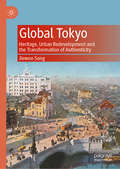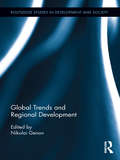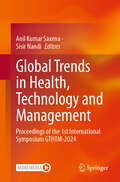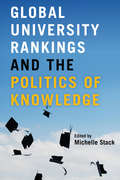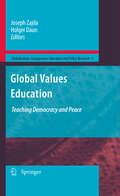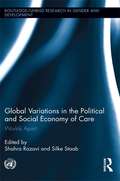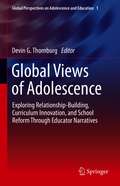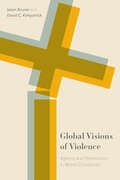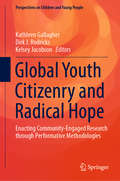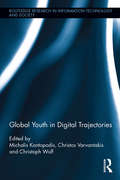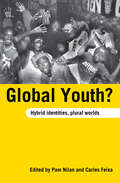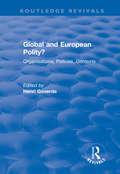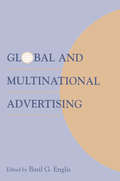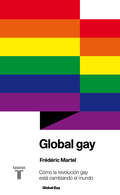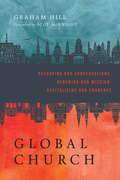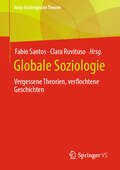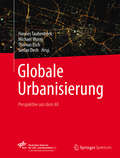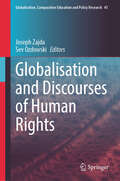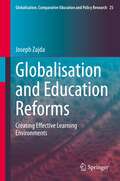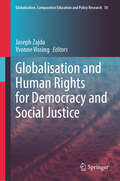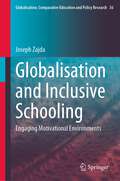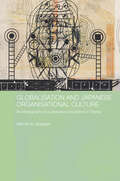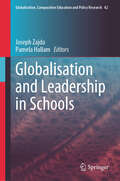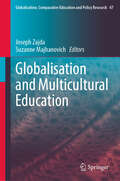- Table View
- List View
Global Tokyo: Heritage, Urban Redevelopment and the Transformation of Authenticity
by Jiewon SongThis book examines heritage-led regeneration and decision-making processes in Tokyo’s urban centres of Nihonbashi and Marunouchi. Detailing some of the city’s most prominent and recent redevelopment projects, Jiewon Song recognizes key institutions and actors; their collective actions as placemakers; and how they project the authenticity of urban places in planning processes. Song argues that heritage-led regeneration tends to monopolize authenticity by weakening the visibility of other cultural and historic qualities in urban places. Authenticity consequently turns into a singular entity leading to the homogenization of urban places. As cities increasingly seek authenticity in the urban age, nation-states initiate top-down processes to achieve such ends, interweaving nationalism and national narratives into placemaking practices. In this fashion, Song challenges existing scholarship on urban conservation, global cities and the notion of authenticity.
Global Trends and Regional Development (Routledge Studies in Development and Society)
by Nikolai GenovFor millennia, contact between societies was limited to trade or wars, a situation that changed profoundly with the development of global markets serving industrialization. The outcome was the emergence of one global human civilization, and one common future that will depend on the capacity of individuals and societies to manage the potentials for social development. This edited collection is dedicated to the discussion of four global trends: upgrading the rationality of organizations, individualization, the spreading of instrumental activism and universalization of value-normative systems. The mutual influence of these interrelated trends brings about both constructive and destructive effects in social life, social integration and change. Contributors examine questions such as: How do global trends pave their way in regions? What are the similarities and differences of regional development? How do agencies cope with the challenges of global trends in regional development?
Global Trends in Health, Technology and Management: Proceedings of the 1st International Symposium GTHTM-2024
by Anil Kumar Saxena Sisir NandiThis book presents the proceedings of the 1st International Symposium on Global Trends in Health, Technology and Management (GTHTM-2024), held on March 15-17, 2024, in Dehradun, India. It reports on recent advances in the interdisciplinary fields of health, technology, and management covering a broad spectrum of topics like drug discovery and development including diseases like cancer, tropical and lifestyle diseases, agroecology, artificial intelligence, and machine learning. The symposium is jointly organised by the Global Health Techno Management Forum and the Global Institute of Pharmaceutical Education and Research, Kashipur, India, together with the Veer Madho Singh Bhandari Uttarakhand Technical University, Dehradun, India. It builds on the success of previous conferences such as the International Symposium on Drug Design and Development Research (DDDR-2021), International Symposium on Current Trends in Pharmaceutical and Medical Sciences (CTPMS-2020), International seminar on Global Trends in Health and Environment (2016), International Seminar on Pharmaceutical Education and Research (ISPER-2010), and the 9th International Symposium on Computational Methods in Toxicology and Pharmacology Integrating Internet Resources (CMTPI-2017). Offering a timely snapshot of cutting-edge, multidisciplinary research and developments in drug design and health sciences, these proceedings facilitate the transfer of these findings to industry and offer a unique perspective on One Health sustainability. As such, the book will appeal not only to students and researchers but also to professionals interested in these fields.
Global University Rankings and the Politics of Knowledge
by Michelle StackFor many institutions, to ignore your university’s ranking is to become invisible, a risky proposition in a competitive search for funding. But rankings tell us little if anything about the education, scholarship, or engagement with communities offered by a university. Drawing on a range of research and inquiry-based methods, Global University Rankings and the Politics of Knowledge exposes how universities became servants to the education industry and its impact. Conceptually unique in its scope, Global University Rankings and the Politics of Knowledge addresses the lack of empirical research behind university and journal ranking systems. Chapters from internationally recognized scholars in decolonial studies provide readers with robust frameworks to understand the intersections of coloniality and Indigeneity and how they play out in higher education. Contributions from diverse geographical and disciplinary contexts explore the political economy of rankings within the contexts of the Global North and South, and examine alternatives to media-driven rankings. This book allows readers to consider the intersections of power and knowledge within the wider contexts of politics, culture, and the economy, to explore how assumptions about gender, social class, sexuality, and race underpin the meanings attached to rankings, and to imagine a future that confronts and challenges cognitive, environmental, and social injustice.
Global Values Education
by Joseph Zajda Holger DaunThis, the seventh in the 12-volume series Globalisation, Comparative Education and Policy Research, presents scholarly research on major discourses in values education globally. It is an accessible, practical yet scholarly resource that explores international concerns in the field of globalisation and comparative education. A vital sourcebook of ideas for researchers, practitioners and policy makers in values education, multiculturalism and moral education, the volume also provides a timely overview of current issues affecting values education, comparative education and education policy research in the global culture. Drawing on recent studies in the areas of globalisation, equity, social justice, and the role of the state, the book critically examines the interplay between values education, globalisation, and dominant ideologies, and reflects on its implications for policy. It goes further to explore conceptual frameworks and methodological approaches applicable in the research covering values education, globalisation, equity, and multicultural education. Individual chapters critically analyse the dominant discourses and debates pertaining to values education, multiculturalism and relevant comparative education discourses. In addition, the book evaluates the ambivalent and problematic relationship between the state, its dominant models of values education, globalisation and social change. The authors employ a number of diverse paradigms in comparative education research, ranging from critical theory to globalization. By focusing on ideology, globalisation and democracy, they attempt to examine critically both the reasons for, and the outcomes of, education reforms in the domain of values education, policy change and transformation. In doing so, they provide a more informed critique of Western-driven models of accountability, quality and school effectiveness.
Global Variations in the Political and Social Economy of Care: Worlds Apart (Routledge/UNRISD Research in Gender and Development)
by Shahra Razavi Silke StaabCare work, both paid and unpaid, contributes to well-being, social development and economic growth. But the costs of providing care are unequally borne across gender and social class. Feminist scholarship on the gendered construction of welfare provisioning and welfare regimes has produced a conceptually strong and empirically grounded analysis of care, reinforcing the necessity of rethinking the distinctions between "the public" and "the private" as well as the links between them. Yet this analysis, premised on post-industrial contexts, does not travel easily to other parts of the world. Many of its core assumptions – about family structures, labor markets, state capacities, and public social provisioning – do not hold for a wider range of countries. Drawing on original research on the care economy in three developing regions (Africa, Asia, Latin America), this volume addresses a major empirical lacuna while facilitating a conversation across the North-South divide.
Global Views of Adolescence: Exploring Relationship-Building, Curriculum Innovation, and School Reform Through Educator Narratives (Global Perspectives on Adolescence and Education #1)
by Devin G. ThornburgThis book addresses what teachers and school leaders from a dozen countries see as the social and emotional strengths, interests and needs of adolescents in their schools and communities; how they innovate their programs and practices to respond to their students’ lives. The book also describes how educators themselves benefit from social and emotional supports to be responsive. Rather than assume that there are universal themes in adolescents’ lives, the book is intended to illuminate the local, contextual, and powerful insights of educators daily working with students. In many intentional respects, each serves as an action research study with an effort to better the process and outcomes of their students’ growth and learning as well as to enrich the classroom. The chapters are organized by themes, ranging from challenges adolescents face in that particular locale to curriculum work that is project-based, transdisciplinary, and tied to the communities where the adolescents live. ‘The voices of adolescents, particularly with regard to their social and emotional development have been neglected in the literature. Thus, we know very little about their feelings and personal experiences as they progress through their schooling. A book such as this will be beneficial in terms of providing a contribution to this field, thereby increasing our understanding of the issues faced by adolescents across countries and cultures.’ Peggy L. Anderson, Ph.D., Metropolitan State University of Denver ‘The outstanding strength of this book is quite precisely its international scope: here is an anthology that lives up to the claims made by its title. Anyone interested in either adolescent development or Social and Emotional Learning in real world as opposed to abstract settings will appreciate the breadth of experience described.’ Mokhtar El Maouhal, Laboratoire de Recherche sur les Langues et la Communication
Global Visions of Violence: Agency and Persecution in World Christianity
by Kate Kingsbury John Corrigan Omri Elisha Joel Cabrita Hillary Kaell Melani McAlister Harvey Kwiyani Candace Lukasik John Boopalan Christie Chui-Shan ChowIn Global Visions of Violence, the editors and contributors argue that violence creates a lens, bridge, and method for interdisciplinary collaboration that examines Christianity worldwide in the twentieth and twenty-first centuries. By analyzing the myriad ways violence, persecution, and suffering impact Christians and the imagination of Christian identity globally, this interdisciplinary volume integrates the perspectives of ethicists, historians, anthropologists, and ethnographers to generate new conversations. Taken together, the chapters in this book challenge scholarship on Christian growth that has not accounted for violence while analyzing persecution narratives that can wield data toward partisan ends. This allows Global Visions of Violence to push urgent conversations forward, giving voice to projects that illuminate wide and often hidden landscapes that have been shaped by global visions of violence, and seeking solutions that end violence and turn toward the pursuit of justice, peace, and human rights among suffering Christians.
Global Youth Citizenry and Radical Hope: Enacting Community-Engaged Research through Performative Methodologies (Perspectives on Children and Young People #10)
by Kathleen Gallagher Dirk J. Rodricks Kelsey JacobsonThis book explores the affective and relational lives of young people in diverse urban spaces. By following the trajectories of diverse young people as they creatively work through multiple and unfolding global crises, it asks how arts-based methodologies might answer the question: How do we stand in relation to others, those nearby and those at great distances? The research draws on knowledges, research traditions, and artistic practices that span the Global North and Global South, including Athens (Greece), Coventry (England), Lucknow (India), Tainan (Taiwan), and Toronto (Canada) and curates a way of thinking about global research that departs from the comparative model and moves towards a new analytic model of thinking multiple research sites alongside one another as an approach to sustaining dialogue between local contexts and wider global concerns.
Global Youth in Digital Trajectories (Routledge Research in Information Technology and Society)
by Christoph Wulf Michalis Kontopodis Christos VarvantakisGlobal Youth in Digital Trajectories explores the most recent developments regarding youth and media in a global perspective. Representing an innovative contribution to virtual research methods, this book presents research carried out in areas as diverse as Greece, the Netherlands, Germany, Brazil, Russia, and India. The volume examines which new anthropological, and cultural-historical conditions and changes arise in connection with the widespread presence of digital media in the lives of the networked teens. Indeed, it is highlighted that the differentiation between an offline world and an online world is inapplicable to the lives of most young people. Exploring youth’s imaginary productions, personal sense-making processes and cross-media dialogues in today’s multimedia worlds, Global Youth in Digital Trajectories will be of particular interest to undergraduates and postgraduates in the fields of sociology, anthropology, education studies, media research and cultural studies. It may also appeal to practitioners in social work and schools. URL for circulation: www.routledge.com/9781138236035
Global Youth?: Hybrid Identities, Plural Worlds
by Pam Nilan Carles FeixaThis innovative collection of studies by international youth researchers, critically addresses questions of ‘global’ youth, incorporating material from regions as diverse as Sydney, Tehran, Dakar and Manila, and advancing our knowledge about young people around the globe. Exploring specific local youth cultures whilst mediating global mass media and consumption trends, this book traces subaltern ‘youth landscapes’ and tells subaltern ‘youth stories’ previously invisible in predominantly western youth cultural studies and theorizing. The chapters here serve as a refutation of the colonialist discourse of cultural globalization. Showcasing previously unpublished youth research from outside the English-speaking world alongside the work of well-known researchers such as Huq and Holden, these accounts of youth cultural practices highlight much that is predictably different, but also a great deal of common ground. This book goes inside creative cultural formation of youth identities to critically examine the global in the local. Bringing together an internationally diverse group of researchers, who describe and analyze youth cultures throughout Europe, the Americas, Asia, Africa and Oceania, this volume presents the first comprehensive review of global youth cultures, practices and identities, and as such is a valuable read for students and researchers of youth studies, cultural studies and sociology.
Global and European Polity?: Organisations, Policies, Contexts
by Henri GoverdeThis title was first published in 2000: The contents of this text are structured by three sub-themes. Firstly, the internationalization of Europe. This field studies threats and chances of re-institutionalization of nation-state societies and the role of the public sector therein, acknowledging the dynamics of the ever-changing international political and economic relations. The second sub-theme is the creative firm in a European context. The object of this field is the conditions for innovative organization and management of firms in Europe, taking into account the necessary adjustments to emerging European political and economic transformations. The final sub-theme is innovative environmental and spacial policy in a European context. This section has its object in the far-reaching transformations that European societies and particularly the Dutch societies are witnessing. These transformations concern the functional relations and spatial and environmental conditions as well as the emerging changes in the way planning and policy institutions deal with their new targets.
Global and Multinational Advertising
by Basil G. EnglisFew applied disciplines are more sensitive to cross-cultural issues than marketing and consumer psychology. The chapters prepared for this volume reflect awareness of both similarities and differences within and across cultures. They include analyses of methodological issues, theoretical investigations of cultural and social values and their implications for marketing specialists, studies of gender- and sub-culture specific advertising, and investigations of advertising efforts in several different international markets. The scholars and advertising professionals who contributed these chapters will have much to say to consumer psychologists and marketing specialists alike.
Global gay
by Frédéric MartelUna investigación sin precedentes alrededor del mundo sobre la cuestión gay. De una esquina a otra del planeta, la revolución gay está en marcha. De la resistencia contra la represión en China, Cuba o Irán al activismo a favor del matrimonio para parejas del mismo sexo en Estados Unidos y en Europa. De lo underground al mainstream. De la criminalización de la homosexualidad a la criminalización de la homofobia. Durante cinco años Frédéric Martel ha llevado a cabo un estudio sin precedentes en cuarenta y cinco países, desde los más abiertos a los más hostiles, reuniéndose con centenares de actores de esta revolución. A través de ese novedoso prisma, este libro dibuja una verdadera geopolítica de la globalización gay analizando los cambios en los modos de vida, la redefinición del matrimonio, la emancipación paralela de las mujeres y los homosexuales o el impacto decisivo que han supuesto Internet y las redes sociales. Aunque se desarrollen bajo una misma bandera, las singularidades de la vida local y la ausencia de homogeneidad de las comunidades gays de todo el mundo son fascinantes. Martel descubre que la globalización no se traduce necesariamente en uniformización: la diversidad es infinita. Como termómetro de la evolución de las mentalidades, la cuestión gay se ha convertido en un valioso criterio para juzgar el estado de una democracia y la modernidad de un país. Este libro, rico en retratos y testimonios sorprendentes, cuenta este nuevo frente en el que ahora se libra la batalla por los derechos del hombre. Reseñas:«Libro-investigación que se lee como una historia que cuenta la nueva batalla de los derechos humanos.»Slate «La homosexualidad presenta mil caras distintas en todo el mundo y este formidable ensayo sociológico sobre la revolución gay firmado por Frédéric Martel ofrece una síntesis esclarecedora.»Le Point «Cuando Frédéric Martel dice que se ha propuesto averiguar cómo funciona un fenómeno de masas, va en serio. Quiere decir que va a pasar años viajando por una cincuentena de países de todo el mundo, que va a entrevistar a miles de personajes pequeños y grandes y va a escribir un libro con conclusiones a las que pocos hemos llegado antes.»ICON
GlobalChurch: Reshaping Our Conversations, Renewing Our Mission, Revitalizing Our Churches
by Graham HillGlobalChurchSimon ChanRuth Padilla DeBorstSamuel EscobarAjith FernandoMakoto FujimuraGustavo GutiérrezEmmanuel KatongoleNelson MandelaVishal MangalwadiC. René PadillaLamin SannehSadhu Sundar SinghVinoth RamachandraAmos YongGlobalChurch
Globale Soziologie: Vergessene Theorien, verflochtene Geschichten (Neue Soziologische Theorie)
by Fabio Santos Clara RuvitusoDie Herausgebenden legen mit „Globale Soziologie“ einen Band vor, der in Debatten um die Dekolonisierung der Disziplin interveniert. Sie vereinen Beiträge, die anhand dreier Fragenkomplexe die international bereits geebneten, im deutschsprachigen Raum jedoch kaum betretenen Wege zu einer Globalen Soziologie aufzeigen und erweitern. Sie stellen zunächst die Geschichte der Soziologie auf den Prüfstand und fragen, von welchen Standpunkten aus „klassische“ Theorien entworfen wurden und wessen Lebensrealitäten sie erfassen und adressieren. Insbesondere die ungleichen Voraussetzungen in der Konstruktion und Zirkulation von „Klassikern“ bei institutionell hergestellter Unsichtbarkeit anderer Werke finden Berücksichtigung. Zweitens gehen die Beiträge des Buchs der Frage nach, welche epistemologischen und methodologischen Schlüsse sich aus diesen historiographischen und theoretischen Kritiken und Rekonstruktionen ziehen lassen. Sie erarbeiten Vorschläge, die einen erkenntnistheoretischen Wandelhin zu einer reflexiven, multiperspektivischen und global verflochtenen Soziologie begründen und fortführen können. Drittens werden Schlüsselthemen identifiziert und anhand empirischer Studien aus der Arbeit-, Migrations- und Geschlechtersoziologie illustriert.
Globale Urbanisierung
by Stefan Dech Thomas Esch Hannes Taubenböck Michael WurmAuf dem ganzen Erdball drängen die Menschen vom Land in die Städte. Den prognostizierten globalen Bevölkerungszuwachs werden komplett die Städte auffangen. Mit dieser gewaltigen Wanderungsbewegung gehen dramatische Veränderungen der globalen Siedlungslandschaft einher: Neue Millionenstädte entstehen aus dem Nichts, Slums wuchern in jede noch so kleine städtische Freifläche, Megacities fressen sich unaufhaltsam ins Hinterland. Vorstädte erstrecken sich ins Unendliche, Städte verschmelzen miteinander und urbane Zentren wachsen in den Himmel. Stadtlandschaften entstehen in neuen Dimensionen, Strukturen und Mustern. Megaregionen mit mehr als 100 Millionen Einwohnern definieren eine neue urbane Geographie. Die globale Stadt ist dauerhaft im Wandel, dynamischer als jemals zuvor. Erdbeobachtung aus dem All bietet einen einzigartigen Blick auf die Siedlungslandschaften unseres Planeten. Exemplarisch visualisiert das Cover leuchtende Straßenzüge bei Nacht und macht damit die pulsierenden Lebensadern einer Stadt sichtbar. Bisher hatte die Forschung im fernerkundlichen Bereich jedoch überwiegend methodische Entwicklungen im Fokus. Dieses Buch setzt die Ergebnisse der Erdbeobachtung gezielt ein, um raumwissenschaftliche Erkenntnisse zu Fragestellungen im Kontext globaler Urbanisierung zu erlangen. Dabei präsentieren die Autoren Studien zu Städten und Regionen auf allen fünf Kontinenten der Erde, zu großen und kleinen Städten, zu geplanten und ungeplanten, zu alten und neuen, zu armen und reichen, zu erfolgreichen oder gefährdeten. Es zeichnet ein umfassendes Bild globaler Urbanisierungsprozesse und ihrer räumlichen Auswirkungen. Die gebaute Stadt wird ebenso betrachtet und analysiert wie ihre Auswirkungen auf den sie umgebenden Raum und die Rückkopplung mit den in den Städten lebenden Menschen. Urbanisierung ist mehr als die Summe ihrer demographischen, funktionalen oder morphologischen Aspekte. Im Verbund mit anderen wissenschaftlichen Disziplinen eröffnet die Fernerkundung neuartige Perspektiven und Erkenntnisse zu dieser komplexen Thematik.
Globaler Katholizismus, Toleranz und die offene Gesellschaft: Eine empirische Studie über die Wertesysteme der Katholiken
by Arno Tausch Stanislaw ObirekDieses Buch bewertet systematisch die politischen und sozialen Werte der mehr als 1,3 Milliarden Katholiken auf der ganzen Welt, der bei weitem größten Konfession des westlichen Christentums. Auf der Grundlage einer umfassenden Analyse von Daten aus dem World Values Survey und anderen globalen Meinungsumfragen wirft das Buch ein neues Licht auf die Wertesysteme und Meinungen der Katholiken. Die Autoren heben zentrale Probleme und Herausforderungen hervor, mit denen die Kirche derzeit bei der Anpassung an die moderne Welt konfrontiert ist, einschließlich des katholischen Antisemitismus, der religiösen und sexuellen Toleranz und der Meinungen zur Demokratie, und bieten gleichzeitig eine anthropologische Reflexion darüber, wie gut sich die Kirche an die Anforderungen einer offenen Gesellschaft anpasst oder nicht.
Globalisation and Discourses of Human Rights (Globalisation, Comparative Education and Policy Research #45)
by Joseph Zajda Sev OzdowskiThis book examines dominant discourses in human rights education globally. Using diverse paradigms, ranging from critical theory to discourse analysis, it examines major human rights education reforms and policy issues in a global culture. It also focuses on the ambivalent and problematic relationship between human rights education discourses, ideology and the state. The book discusses democracy, ideology and human rights, which are among the most critical and significant factors defining and contextualising the processes surrounding human rights education globally. It critiques human rights education practices and policy reforms, illustrating the shifts in the relationship between the state, ideology, and human rights education policy. The book also examines developments in research concerning human rights education. Readers will gain a more holistic understanding of the nexus between human rights education, and dominant ideologies, both locally and globally. The book also provides easily accessible, practical yet scholarly insights into international concerns in the field of human rights education in the context of global culture.
Globalisation and Education Reforms: Creating Effective Learning Environments (Globalisation, Comparative Education and Policy Research #25)
by Joseph ZajdaThis book analyses discourses of effective learning environments globally. It focuses on the student’s cultural identity and academic achievement, the significance of cultural and social capital to student’s academic achievement, motivational strategies enhancing engagement and performance, effective teaching strategies, and quality in education for all. The book discusses and evaluates the shifts in methodological approaches to effective learning environments and globalisation. It analyses such topics as the students’ cultural identity and achievement, motivational strategies for creating effective learning environment, constructivist pedagogy for critical thinking, dimensions of discrimination in schools globally, intelligence testing and the effects on academic achievement, and values education in the classroom. The book evaluates the shifts in methodological approaches to globalisation and effective learning environments globally, and their impact on education policy and pedagogy. It contributes in a very scholarly way, to a more holistic understanding of the nexus between globalisation, comparative education research and effective learning environments education reforms.
Globalisation and Human Rights for Democracy and Social Justice (Globalisation, Comparative Education and Policy Research #50)
by Joseph Zajda Yvonne VissingThis book analyses major discourses of human rights for democracy and social justice. The chapters contained in the book examine critically major issues confronting human rights for democracy and social justice both locally and globally. The chapters analyze the challenges that different societies are confronted with, as they attempt to implement, protect and defend democracy, cultural diversity and human rights in an ever-changing world, and culturally diverse environment. Topics covered include dimensional concerns for social justice and human rights and what to do about them, human rights for democracy and social justice, and celebrating cultural diversity in sport. The book will help readers to explore their own views and consider more broadly what may be in the best interests of a fair and just society, as envisioned in human rights treaties, human rights education in schools, and cultural diversity.
Globalisation and Inclusive Schooling: Engaging Motivational Environments (Globalisation, Comparative Education and Policy Research #36)
by Joseph ZajdaThis book analyses discourses of inclusive schooling and engaging motivational environments globally. It focuses on the student’s identity, belonging, performance in the classroom, and the significance of cognitive, cultural, emotional and social capital to student’s academic achievement. The book discusses and evaluates the shifts in methodological approaches to inclusive and engaging learning environments. It analyses topics such as the students’ cultural identity and achievement, motivational strategies for creating engaging learning environment, the use of constructivist pedagogy for critical thinking, social constructivism, and values education in the classroom. The book also analyses and evaluates the shifts in methodological approaches to globalisation and inclusive schooling globally, and their impact on performing schools. It contributes in a very scholarly way, to a more holistic understanding of the nexus among globalisation, comparative education research, inclusive schooling and engaging learning environments.
Globalisation and Japanese Organisational Culture: An Ethnography of a Japanese Corporation in France
by Mitchell SedgwickGlobalisation � the global movement, and control, of products, capital, technologies, persons and images � increasingly takes place through the work of organisations, perhaps the most powerful of which are multinational corporations. Based in an ethnographic analysis of cross-cultural social interactions in everyday workplace practices at a subsidi
Globalisation and Leadership in Schools (Globalisation, Comparative Education and Policy Research #42)
by Joseph Zajda Pamela HallamThis book analyses dominant discourses of globalisation and leadership in schools. The chapters in this volume advance further the discussions of the nexus between globalisation and leadership in schools. The politics of education reforms, governance and school leadership in the 21st century reflect a new emerging paradigm of standards-driven and outcomes-defined educational policy change. This ethos of academic performance has affected the nature and the role of school leadership in the 21st century, and emerging educational challenges and strategies. Academic achievement, standards, and educational results overall, depend on the nature and quality of school leadership, teachers and school’s culture. Another emerging change affecting school leadership is autonomy in schools in designing curricula and managing resources, where the role of the school leader has grown far beyond that of administrator. School autonomy has also affected the changing role of school leadership. The other key role of effective leadership is the focus on diagnosing the school’s needs, and supporting, evaluating and developing teacher quality. Developing school leaders in the 21st century requires clearly defining their key leadership roles and responsibilities for leading and inspiring teachers to achieve high academic standards, and the quality of the curriculum, and acknowledging, and accepting their significant role in improving school‘s image, as a standards-driven and academically performing institution.The book contributes in a very scholarly way, to a more holistic understanding of the nexus between globalisation, and dominant discourses of leadership in schools.
Globalisation and Multicultural Education (Globalisation, Comparative Education and Policy Research #47)
by Joseph Zajda Suzanne MajhanovichThis book analyses dominant discourses of globalisation, multiculturalism and schooling. The chapters advance further the discussions on globalisation and its impact on cultural diversity and multiculturalism in a globalised world. Multicultural education, as presented in this volume, is seen in a broad context. It includes factors such as race, ethnicity, gender, socio-economic status, culture, age, and physical ability, as well as a variety of beliefs and values. Zajda has argued that globalisation represents a synthesis of technology, ideology, and organisation, specifically related to border crossings of people, global finance, trade, IT convergence, as well as cross-cultural communication. The reality of multiculturalism has been brought into stronger focus because of globalisation. Multiculturalism is more evident today because of globalisation. The book contributes in a very scholarly way, to a more holistic understanding of the nexus between globalisation and dominant models of multicultural education, and their impact on students’ engagement, and academic achievement.
